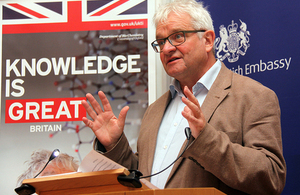Nobel Prize winner Sir Paul Nurse gave talk on ‘Trust in Science’
Sir Paul Nurse, President of the Royal Society and Nobel Laureate, highlights the importance of trust in science for knowledge generation, innovation and the benefit to society.

Nobel Prize winner Sir Paul Nurse gave talk on ‘Trust in Science’
Scientists need to be open, honest, rigorous in their thinking and sceptical, especially of their own ideas. Get out of the laboratory, engage with the public…. if you have a talent for communication, get in front of the TV camera.
Sir Paul was speaking at the Daiwa Ichiban lecture hosted on Thursday 8th October at the Ambassador’s Residence at the British Embassy Tokyo in collaboration with Daiwa Anglo-Japanese Foundation. He outlined why trust is important for science; what is it about science that makes it such a trustworthy process to generate knowledge about the natural world? How can trust in science be built with the public? What does society need from scientists to ensure that they are trusted? And what are the threats to trust in science and what can be done about them?
Curiosity and observation
Sir Paul highlighted what science has achieved over the ages and some of the key attributes and ways of working. He emphasised that science is built on reliable and reproducible observations, generating accurate descriptions of how the natural world behaves; such evidence forms the bedrock of the scientific endeavour. He quoted Karl Popper to explain the scientific approach
scientific knowledge evolves, and is often tentative especially at the beginning of an investigation. It is only after repeated testing that it becomes more secure.
In praise of sceptics
Sir Paul is President of The Royal Society, the oldest Academy of Science in the world and its motto, also from the 1660s, “nullius in verba” can be roughly translated as “take no-one’s word for it”. Scientifics should remember Francis Bacon’s call for a sceptical approach in the pursuit of knowledge:
If a man will begin with certainties he shall end in doubts, but if he will be content to begin with doubts, he shall end in certainties.
Science for future society
The knowledge science has brought about, has led to many improvements to human society and culture but how can we ensure that science will continue to prosper and bring about improvements in the human condition? Sir Paul noted Japan’s success in applying science for human benefit; from pioneering use of robotics in Japanese industry to the electronics revolution recognised by last year’s Nobel Prize for LED technology.
To continue to benefit from science, Sir Paul argued that we need great scientists supported by strong scientific education system and public engagement on science. In discussion after the lecture, he suggested British weather might be one factor behind UK research excellence: no distracting extremes to get in the way of pursuit of knowledge.
Further information
The Full text of Sir Paul’s lecture can be downloaded at the Daiwa Anglo-Japanese Foundation’s website
For more about UK excellence in research and innovation see our Japanese language website
The lecture was sponsored by the Daiwa Anglo-Japanese Foundation which funds grants scholarships and events to support closer links between Britain and Japan.